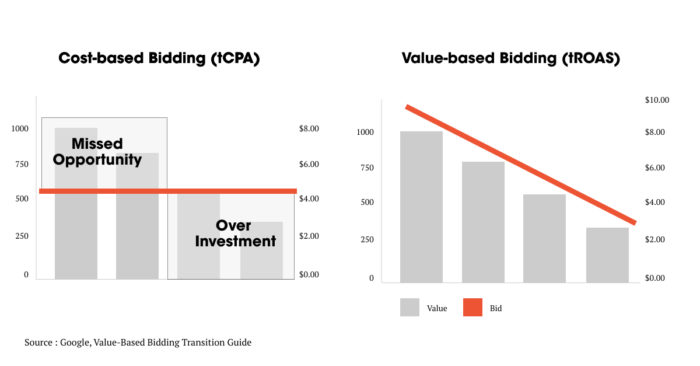Why use Value-Based Bidding?
Value-based bidding offers one major advantage over other bidding strategies such as target CPA or maximising conversions within SEA. It allows you to prioritize your budget on the value each customer brings in, as opposed to a cost-based strategy. With this strategy, we put the focus on cost-benefit.
This means that website visitors who characterise the qualities of a high value customer are likely to be followed somewhat harder by advertisements than other website visitors. Less budget is spent on customers who are going to bring in less.
In the diagrams below, you can clearly see where things can "go wrong" with a cost-based bidding strategy. If you would treat all types of (potential) clients in the same way with cost-based bidding strategies, you run the risk of investing too much for lower quality prospects. You also risk under-investing in your most profitable opportunities/prospects. But if you prioritize your segments by value, you can maximize the return on your budget.

Most B2B or subscription businesses know by now that not all prospects or customers are created equal. Often certain customers bring in more value than others. In these times of uncertainty, using Smart Bidding more important than ever, as it allows you to adapt to dynamic auctions and volatility in demand. Smart Bidding is also able to adapt and take faster account of shifts in search trends. The algorithm will go after more auctions if it sees an opportunity to do so while converting efficiently. Finally, it gives you the control to set goals and budgets that the customer is comfortable with. Finally, machine learning will ensure that you get the best possible results for the budget available.
Value-based bidding with fictitious/calculated values?
Value-based bidding is all well and good, but it seems that especially webshops benefit from this strategy, because of the conversion value that can be returned to the campaigns. Not so, because you can also work with fictitious values or calculated values.
Suppose you have a customer who wants to measure several things: a contact request, a quotation request and an appointment booking. The most important conversion is booking an appointment and a contact request is worth less than the quotation request. Research shows that someone who requests a quotation more often actually becomes a customer than someone who makes a contact request.
To work with value-based bidding here, you can set a fictitious value per conversion:
- A contact request is given a notional value of 10.
- A request for quotation is given a notional value of 50.
- Booking an appointment has a notional value of 100.
In this way, we associate a notional value to each conversion and the algorithm will automatically start optimizing to the most valuable conversion and, therefore, to the most valuable prospect/customer.
In addition, this also offers the possibility of working with a fictitious Target ROAS, since you have a fictitious value linked to each conversion. Of course, it is best to calculate which is the desired Target ROAS/ from which point you are profitable.
Does this really work?
We tested this for you with one of our current clients and saw an immense boost in performance. Most of the budget went to the most valuable conversions. We achieved the target ROAS and also saw an increase in volume for almost the same budget.
Need help setting up your campaigns with value-based bidding or have questions about something? Please don't hesitate to contact us at contact!




